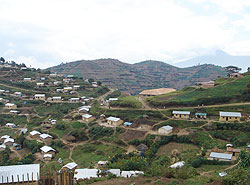The triumph of decency By Paul Ntambara Eradication of grass thatched houses locally known as Nyakatsi was one of the resolutions of the 8th National Dialogue held in December 2010. The resolution echoes well into Rwanda’s Vision 2020 aspiration to become a modern, strong and a united nation, proud of its fundamental values, politically stable and without discrimination amongst its citizens. Promotion social welfare of the people is central to this Vision.


The triumph of decency
By Paul Ntambara
Eradication of grass thatched houses locally known as Nyakatsi was one of the resolutions of the 8th National Dialogue held in December 2010. The resolution echoes well into Rwanda’s Vision 2020 aspiration to become a modern, strong and a united nation, proud of its fundamental values, politically stable and without discrimination amongst its citizens. Promotion social welfare of the people is central to this Vision.
The Nyakatsi eradication campaign was strongly supported by central government. In the 2009 national budget, the campaign received 1.5billion and in 2010 the amount was increased to 4billion. This is in addition to various forms of support from different development partners and small contributions from citizens.
"The plan was to get people out of scattered grass thatched houses to decent houses in planned villages (Umudugudu). We took advantage of local initiatives like community work, Army and Police week, Youth and Women week to engage in activities aimed at helping the vulnerable get decent housing,” says Augustine Kampayana, head of the Rural Settlement Task Force at the Ministry of Local Government.
The ministry of Local Government (MINALOC), the Rwanda Defense Forces (RDF) and the Rwanda National Police (RNP) in support to the national social economic development, jointly undertook to eradicate the grass thatched houses countrywide.
The campaign targeted three categories of people. Category O comprised of the vulnerable who were to receive100 per cent support to acquire decent housing, category A comprised of people who are poor but able-bodied. These were to be helped with roofing materials and other support through community work.
Category B comprises of people who can afford decent housing but only needed a change of mindset. People in this category were sensitized to abandon grass thatched houses and construct iron roofed structures and settle in planned villages.
These categories of people include the historically marginalized. Beneficiaries were selected by the community members and categorized according to their level of need.
"Changing people’s mindset was difficult. Many have lived in these shoddy structures for a longtime so changing them was difficult. Through sensitization we showed them the advantages of living in decent houses,” says Kampayana.
Felicia Nyirarukundo, 38, is a widowed mother of three children. She is one of the 25 beneficiaries of the Nyakatsi eradication campaign in Rugalika sector, Kamonyi district.
She has lived in a grass thatched house since she got married in 1992. It is only this year that she became a proud owner of an iron roofed house, thanks to efforts by Sector officials and local residents.
"I have always dreamt of living in a good house like other women. This dream has now come true. People no longer call me names, I can now walk with my head high,” Nyirarukundo says.
By end of May, 42 000 houses of the planned 47 000 were completed representing a 92 per cent completion rate. Emphasis was put on completion of houses for vulnerable.
Lessons learnt
The exercise improved social cohesion. Community members joined hands to help the poor amongst them. The exercise strengthened community spirit. The exercise increased the number of Grouped villages in many districts. In Gicumbi district of the Northern Province, the percentage of homesteads in grouped villages stood at 43 per cent in December 2010. By the end of March 2011 the figure stood at 62 percent.
"We are happy as government because the program has been successful. It serves as a best practice locally and regionally,” says Kampayana
"We are now looking beyond Nyakatsi. We are mobilizing support to see what next after people have been assisted to get decent houses. Mobilization is on at local communities and other levels to ensure that people who have been helped out of grass thatched houses participate actively in rebuilding there lives and Country.”
Nyakatsi update January 18 2011- May 15 2011
| Province/City
| Families in Nyakatsi as of Jan 18 2011
| Houses built as of May 15 2011
| Families without houses as of May 15
| % of houses completed
|
| Kigali City
| 1, 595
| 1, 501
| 94
| 94 %
|
| Eastern Province
| 6, 930
| 6, 604
| 326
| 95%
|
| Southern Province
| 11, 984
| 11, 385
| 599
| 95%
|
| Northern Province
| 12, 124
| 11, 660
| 464
| 96%
|
| Western Province
| 14, 442
| 12, 272
| 2, 170
| 85%
|
| Total
| 47, 075
| 43, 422
| 3, 653
| 92%
|


